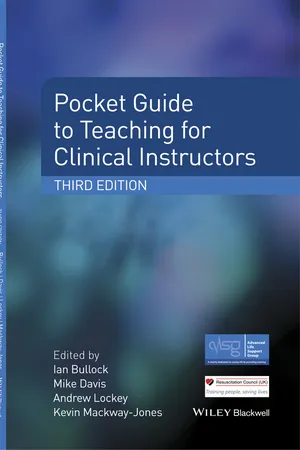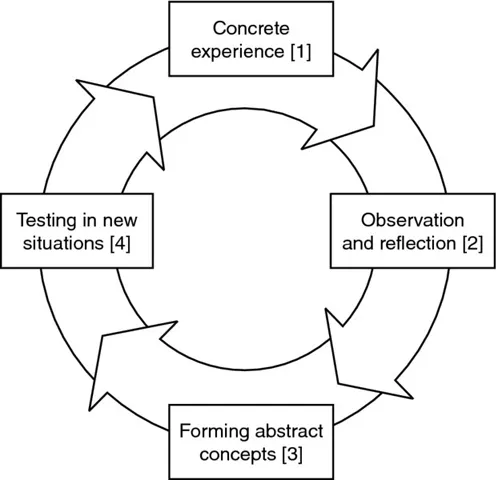
Pocket Guide to Teaching for Clinical Instructors
- English
- ePUB (mobile friendly)
- Available on iOS & Android
Pocket Guide to Teaching for Clinical Instructors
About this book
The Pocket Guide to Teaching for Clinical Instructors, 3rd edition, provides a concise introduction to teaching. Written by experienced medical educators from the Advanced Life Support Group and Resuscitation Council (UK), this best-selling guide gives comprehensive and practical advice on the most effective teaching methods.
Pocket Guide to Teaching for Clinical Instructors covers basic principles and practical aspects of teaching in a variety of modalities. This edition includes material which reflects current developments within instructor courses and includes new material on feedback, an awareness of non-technical skills, the teaching of teams and supporting learners.
This book is essential reading for anyone interested in teaching doctors and healthcare professionals in any context. It is aimed at the relative newcomer to the teaching role in all its variety and provides essential, practical advice as to how to get the best out of learners.
Frequently asked questions
- Essential is ideal for learners and professionals who enjoy exploring a wide range of subjects. Access the Essential Library with 800,000+ trusted titles and best-sellers across business, personal growth, and the humanities. Includes unlimited reading time and Standard Read Aloud voice.
- Complete: Perfect for advanced learners and researchers needing full, unrestricted access. Unlock 1.4M+ books across hundreds of subjects, including academic and specialized titles. The Complete Plan also includes advanced features like Premium Read Aloud and Research Assistant.
Please note we cannot support devices running on iOS 13 and Android 7 or earlier. Learn more about using the app.
Information
CHAPTER 1
Adult learning
Learning outcomes
- how adults learn
- the contribution of experiential learning
- motivation
Introduction
Knowles and the adult learner
Autonomy and self-determination
Life experience and knowledge
Unfreezing – change – refreezing
Goal orientated
Relevance orientated
Practical
… we are not machines and this course gives room for us to think and makes the whole teaching session and the teamwork alive and interesting. It opens up for discussions and that is where you really learn something – not only from the instructors but also from the other candidates.
Esteem
The experiential learning cycle

Table of contents
- Cover
- Pocket Guide to Teaching for Clinical Instructors
- Title Page
- Copyright
- Working group
- Contributors to the third edition
- Contributors to the first and second editions
- Foreword
- Preface to the third edition
- Preface to the first edition
- Acknowledgements
- Chapter 1: Adult learning
- Chapter 2: A structured approach to teaching
- Chapter 3: Lecturing effectively
- Chapter 4: Teaching skills
- Chapter 5: Managing simulations
- Chapter 6: Facilitating discussions
- Chapter 7: Getting assessment right
- Chapter 8: Feedback
- Chapter 9: e-Learning
- Chapter 10: Supporting learning
- Chapter 11: Teaching teams
- Index
- EULA